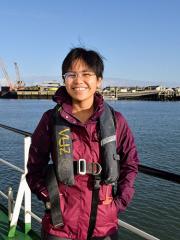Kristine Buenafe

Researcher biography
Kristine, better known as Tin, is a quantitative marine ecologist from the Philippines. Although most of her colleagues in her undergraduate degree chose to go into medicine, she took the road less travelled — a path in research. While most of her colleagues in marine science studied coastal ecosystems, she was more interested in what lies beyond the coasts, also known as the high seas.
Tin has a Master’s degree in Tropical Biodiversity and Ecosystems (TROPIMUNDO), an Eramus Mundus Joint Master’s Degree program, where she finished first in her batch (Plus Grande Distinction). This is a joint degree program between universities in different European countries that allows students to finish credits for each semester in different countries. Due to her scholarship, she was able to live in Belgium, Sri Lanka and Italy. For her Master’s thesis, she collaborated with several UQ supervisors, Professor Anthony J. Richardson and Associate Professor Daniel C. Dunn in particular. Tin designed conservation-sensitive, climate-smart fisheries closures for the high seas of the Pacific Ocean. She showed that fisheries can actively contribute to conservation efforts by designing these closures that can be considered as other effective area-based conservation measures (OECMs).
Since finishing her Master’s degree, Tin has worked closely with Professor Richardson and Associate Professor Dunn to develop methods that could be used by conservation practitioners to transition to more climate-smart spatial planning approaches. She’s done this by prioritising protection on climate refugia. This approach has been used in workshops involving the Commission for the Conservation of Antarctic Marine Living Resources (CCAMLR) and the Norwegian Government on spatial planning for the Weddell Sea in the Southern Ocean, which Tin, along with members of the MME lab, was part of. She’s also been modelling historical larvae distributions of several pelagic fish species using machine learning techniques, which can hopefully be useful to fisheries.
Tin is now a PhD student in the School of the Environment, under the supervision of both Professor Richardson and Associate Professor Dunn. She wishes to continue her work on climate change and spatial planning by taking it a step further and developing ways of designing more connected, climate-smart protected area networks.
